|
KUWAIT CITY: Kuwait and other GCC states have decided to implement strict measures while recruiting workers from Lebanon and Syria and some other unidentified states, reports Al-Seyassah daily quoting reliable sources. This came in response to news reports which said the GCC states have received intelligence information from Beirut and Damascus that the Lebanese security forces had seized from unidentified persons 500 blank Lebanese passports during the withdrawal of Syrian forces from Lebanon on April 26, 2005. Security authorities in the GCC states believe unscrupulous persons might use such passports to carry out hostile actions against GCC states.
|
By Alaa Shahine, BEIRUT (Reuters) – Foreign Secretary Jack Straw urged Syria on Wednesday to cooperate with a U.N. inquiry into the assassination of former Lebanese Prime Minister Rafik al-Hariri and respect the sovereignty of its smaller neighbour.Straw made his comments as diplomats said Syria had agreed to allow U.N. investigators to interview its foreign minister over the killing but was still considering a request for a meeting with President Bashar al-Assad.
"We urge and continue to urge Syria to cooperate fully with those (U.N.) resolutions in particular with the United Nations investigation into the assassination," Straw said at a joint news conference with Lebanese Prime Minister Fouad Siniora."What we want to see is the government of Syria … meeting its international obligations … including the full recognition of the Lebanon as a sovereign, independent state."Straw was the most senior British official to visit Lebanon since Hariri’s assassination in February.The killing sparked weeks of street protests that forced Syria to bow to international pressure to withdraw its troops from Lebanon in April, ending a three-decade military presence and years of political domination.
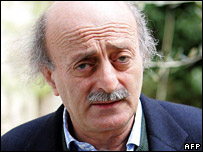 CGGL Staff Local Media 01/05/2006 Beirut, January 5: A syndicated columnist reported in an opinion piece published today in the Beirut Daily Star and partly carried in Arabic by other Beirut daily newspapers that Walid Jumblatt told him in a telephone interview, when asked what he wanted from America: "You came to Iraq & you can do the same thing in Syria." The piece was written by David Ignatius, who opened up by referring to gangster movies. He spoke first of the television interview by former Syrian VP Abdel Halim Khaddam, whom he called an old mafia don and a turncoat, then turned his attention to Jumblatt.
CGGL Staff Local Media 01/05/2006 Beirut, January 5: A syndicated columnist reported in an opinion piece published today in the Beirut Daily Star and partly carried in Arabic by other Beirut daily newspapers that Walid Jumblatt told him in a telephone interview, when asked what he wanted from America: "You came to Iraq & you can do the same thing in Syria." The piece was written by David Ignatius, who opened up by referring to gangster movies. He spoke first of the television interview by former Syrian VP Abdel Halim Khaddam, whom he called an old mafia don and a turncoat, then turned his attention to Jumblatt.
To understand the latest turns of the screw in Syria and Lebanon, Ignatius wrote, I spoke by telephone yesterday with Walid Jumblatt, the leader of Lebanon’s Druze community and something of a warlord himself. Ignatius added: The Druze leader is holed up in his ancestral fortress of Moukhtara, in the Chouf Mountains. Like other Lebanese I spoke with this week, he fears a deadly new attack by the Syrians that would attempt to trigger sectarian conflict in Lebanon — and take the heat off Damascus. Jumblatt argues that the only stable outcome will be regime change in Syria — a "Milosevic solution" that will bring Assad to justice through the United Nations.
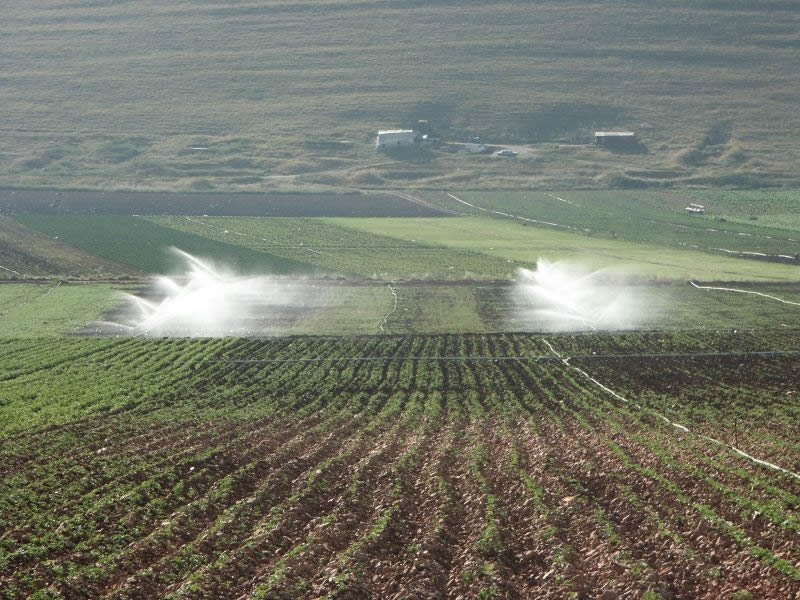 BEIRUT, 2 January (IRIN) – After a steady decrease in the number of landmine victims since the withdrawal of Israeli troops from southern Lebanon in 2000, last year witnessed a sudden resurgence of cases. In December alone, three girls were injured by an unexploded cluster bomb in the south of the country, leading one to have her leg amputated. A foreign worker also had to have a leg amputated after stepping on a landmine at a construction site in Beirut. "We have 21 survivors and five killed this year," Brigadier General Salim Raad, director of the National De-mining Office, established in 1998, said. "The numbers have almost doubled in comparison to 2004." According to Raad, poverty is the main reason behind the increase in cases.
BEIRUT, 2 January (IRIN) – After a steady decrease in the number of landmine victims since the withdrawal of Israeli troops from southern Lebanon in 2000, last year witnessed a sudden resurgence of cases. In December alone, three girls were injured by an unexploded cluster bomb in the south of the country, leading one to have her leg amputated. A foreign worker also had to have a leg amputated after stepping on a landmine at a construction site in Beirut. "We have 21 survivors and five killed this year," Brigadier General Salim Raad, director of the National De-mining Office, established in 1998, said. "The numbers have almost doubled in comparison to 2004." According to Raad, poverty is the main reason behind the increase in cases.
Abdel Wahab Badrakhan, Dar al Hayat, Is al-Zirqawi in Lebanon now? Statements on the Internet websites can take him anywhere. Yet, announcing that his organization is responsible for launching missiles from South Lebanon toward Israeli settlements is a clear message to the Americans rather than the Israelis.Guess who benefits from instigating such a message?Could it be Saddam Hussein, for instance, or the Iraqi resistance, which is striving to extend its struggle to Palestine through Lebanon? Of course not. Could it be "Hezbollah" or some Palestinian groups present in Lebanon, especially "the People’s Front – General Command"? The answer is also no, because these organizations cannot solely call in "Al Qaeda", welcome it, and bear its burdens. As such, if al-Zirqawi really arrived to Lebanon, the party that led him to Iraq led him to Lebanon, i.e. Syria and Iran.
It is most likely that the terrorist organization is not yet present in Lebanon; however, it is not unlikely that it has advocates therein. Did these advocates grow to have the potential to hold missiles and transpierce South Lebanon to launch them on Israel? If this is the case, the situation should alarm the Lebanese army first, and then Hezbollah. In other words, it should alarm the Lebanese government with its rift between Syrian proponents and opposers. Such transpiercing is unjustified except for mere destructive motives and has nothing to do with smart "resistance" that the Lebanese supported -despite the divergence in points of views – and still refuse to undermine its importance. As long as these suspicions swirled around the "General Command" with respect to launching the missiles, this organization has become, following the report of "al-Qaeda", either "innocent" or on the contrary linked to "al-Qaeda". In both cases, its status must be clarified, since this is not the first suspicion that it has been subjected to.
"Despite regional and domestic concerns specific to their countries, Saudis and Lebanese are more optimistic about their futures, more satisfied with their present circumstances, more focused on specific problems that must be solved, and more strongly identified with their countries…"
Significant changes are taking place in public opinion in Saudi Arabia and Lebanon. Despite regional and domestic concerns specific to their countries, Saudis and Lebanese are more optimistic about their futures, more satisfied with their present circumstances, more focused on specific problems that must be solved, and more strongly identified with their countries than when we last polled in 2002. These are some of the findings of a Zogby International poll, conducted during the last half of October 2005. It was sponsored, in part, by the Young Arab Leaders organization, and the Arab American Institute. In an earlier column, I reported the poll
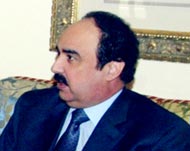 Beirut – Syrian Brigadier General Rustom Ghazaleh, who has been implicated in the murder of a former Lebanese Premier Rafik Hariri, said Tuesday he was ready to resign if asked by Syrian President Bashar al Assad. ‘If the leadership asks me to die a martyr, I am ready,’ Ghazaleh, the former head of Syrian military intelligence in Lebanon, told the television news channel al Jazeera in a broadcast monitored in Beirut.
Beirut – Syrian Brigadier General Rustom Ghazaleh, who has been implicated in the murder of a former Lebanese Premier Rafik Hariri, said Tuesday he was ready to resign if asked by Syrian President Bashar al Assad. ‘If the leadership asks me to die a martyr, I am ready,’ Ghazaleh, the former head of Syrian military intelligence in Lebanon, told the television news channel al Jazeera in a broadcast monitored in Beirut.
‘And if they ask me to resign, I am also ready,’ he added in the comments to al Jazeera in the interview in Damascus. Ghazaleh denied accusations of corruption, including charges last week by Syrian former vice president Abdel Halim Khaddam that Ghazaleh took 35 million dollars from Lebanon’s Al Madina bank which collapsed two years ago. ‘These accusations are all baseless … It is part of the unjust campaign against Syria,’ he said. ‘I am ready…all my relatives are ready, to disclose our financial statements, and if they find any Syrian dime in any country, let them disclose it,’ he said.
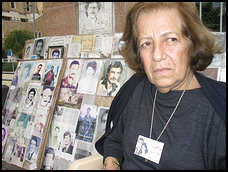 By Anthony Shadid, Washington Post Foreign Service Monday, January 2, 2006; BEIRUT — On this morning, as on every morning since Oct. 17, 1985, Audette Salem cleaned the rooms of her son and daughter. She left his razor, toothbrush and comb as they were on the day her children were abducted from the streets of Beirut during Lebanon’s civil war. She fiddled with her daughter’s makeup and straightened her bed. She dusted the three guitars, the papers still on their desks and the pack that holds a 20-year-old cigarette, the artifacts of two lives interrupted.
By Anthony Shadid, Washington Post Foreign Service Monday, January 2, 2006; BEIRUT — On this morning, as on every morning since Oct. 17, 1985, Audette Salem cleaned the rooms of her son and daughter. She left his razor, toothbrush and comb as they were on the day her children were abducted from the streets of Beirut during Lebanon’s civil war. She fiddled with her daughter’s makeup and straightened her bed. She dusted the three guitars, the papers still on their desks and the pack that holds a 20-year-old cigarette, the artifacts of two lives interrupted.
Everything is there as they left it," she said. "I haven’t changed a thing, nothing at all. It’s all still there."At 70, quiet but determined, Salem is a woman who clings to memories in a country that prefers to forget.In the heart of downtown Beirut, ravaged by a brutal 15-year civil war, then rebuilt into a graceful, if somewhat soulless, urban hub, Salem joins other women every day in a protest demanding to know the fate of their children. Many believe they languish in jails in neighboring Syria. Others are not sure. Behind them, their children’s faces stare from pictures tacked to billboards, blank faces with generation-old haircuts, the dates of their disappearances reading like a war memorial yet to be built.
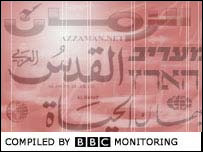 The media in Lebanon and the Middle East has been quick to react to accusations by the exiled former Syrian vice-president Abdul Halim Khaddam implicating President Bashar al-Assad in the murder of the former Lebanese Prime Minister Rafik Hariri.In Lebanon, some commentators class him as a traitor to his country while a leading anti-Syrian politician says the allegations prove Damascus was lying about its role in Mr Hariri’s death.A pan-Arab paper believes his allegations confirm a UN report by German prosecutor Detlev Mehlis which implicates Syrian intelligence in the killing.
The media in Lebanon and the Middle East has been quick to react to accusations by the exiled former Syrian vice-president Abdul Halim Khaddam implicating President Bashar al-Assad in the murder of the former Lebanese Prime Minister Rafik Hariri.In Lebanon, some commentators class him as a traitor to his country while a leading anti-Syrian politician says the allegations prove Damascus was lying about its role in Mr Hariri’s death.A pan-Arab paper believes his allegations confirm a UN report by German prosecutor Detlev Mehlis which implicates Syrian intelligence in the killing.
In neighbouring Israel, a longstanding enemy of Syria, commentators are split over the ramifications for Damascus.In Syria itself, the official media has published numerous attacks against Mr Khaddam, many of which accuse him of dishonesty and malfeasance.
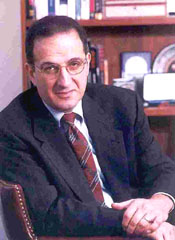 by James Zogby, (Tuesday January 03 2006)
by James Zogby, (Tuesday January 03 2006)



